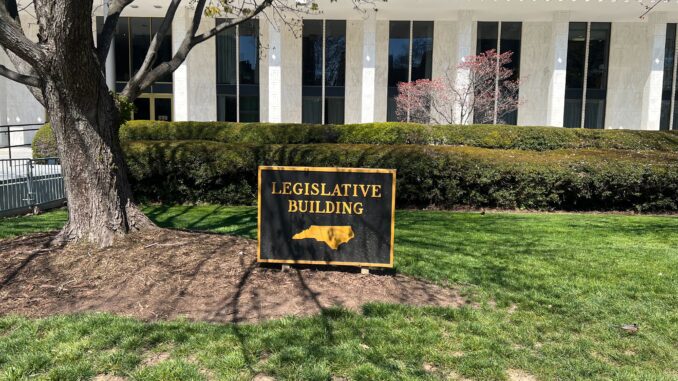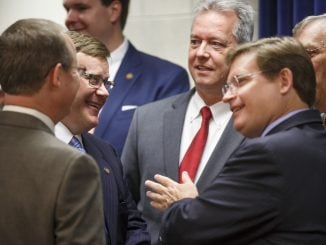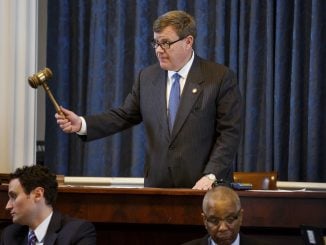
RALEIGH —Democratic Gov. Roy Cooper unveiled on March 15 the final budget proposal of his tenure, one that totals $67 billion in spending over the biennium.
“We are at a historic moment with unprecedented opportunity to make ‘once-in-a-generation’ investments in our future,” said Cooper in a press release. “North Carolina has built on our success to strengthen our place as first in opportunity, and we will continue that growth only by making sound investments in our families, workforce, schools and communities. Let’s take advantage of our unlimited potential to make sure every North Carolinian can thrive.”
The governor’s press statement also claimed his budget, which he has dubbed “First in Opportunity,” is a “responsible, balanced budget that does not raise taxes for North Carolinians,” but his proposal increases state spending over the next two years by 20%.
His $67 billion plan would increase spending by 18%, or $33 billion this year and an additional $34.2 billion the year after, representing another increase of 3.9%.
Earlier this month, General Assembly leadership announced an agreement to increase spending at around half that rate. That agreement proposes a 6.5% increase by spending $29.7 billion in 2023-24 and a 3.75% increase in 2024-25 by spending $30.8 billion.
Top lawmakers called the proposal “reckless.”
“Governor Cooper’s budget proposal takes the same reckless approach to spending that his fellow Democrats have taken in Washington,” said House Speaker Tim Moore (R-Kings Mountain). “Unfortunately, this kind of runaway spending has resulted in a failing economy that has left millions of Americans behind.
“The General Assembly will continue on the fiscally responsible path that has made our state attractive to so many. Now Governor Cooper is proposing a budget that effectively eliminates the tax cuts that will help North Carolinians make ends meet and have attracted families and businesses to our state. Over a decade of Republican budget leadership has put North Carolina on solid financial ground. This is no coincidence– our fiscally responsible approach to spending works.”
Senate Leader Phil Berger (R-Eden) echoed some of Moore’s sentiments.
“This is an irresponsible, unserious proposal from a lame-duck governor who wants future North Carolinians to pick up his tab,” Berger said. “Gov. Cooper wants to go on a reckless spending spree by raising taxes, raiding the state’s savings account, and proposing the largest increase in year-over-year spending in the state’s history. He is following the same failed Democratic playbook that is causing residents to flee blue states like New York, California, and Illinois.”
The governor’s proposed budget covers everything from education and mental health to business needs and transportation — the latter of which drew attention from Senate Transportation Committee Chair Sen. Vickie Sawyer (R-Iredell), who issued a statement criticizing Cooper’s plan.
Sawyer said Cooper’s plan capping transportation-related sales tax transfers from the General Fund at 2% would reduce transportation funding by more than $638 million and a potential reduction of $5 billion over the next 10 years. The 2022 state budget the governor signed increases that transfer to 6% over the next two years.
Other items in the budget proposal include using Medicaid expansion proceeds to invest “$1 billion to address our mental health crisis,” which Cooper says is the “largest investment in state employee compensation in 50 years.”
Cooper proposes $554.3 million in FY 2023-24 and $645.3 million in FY 2024-25 to address North Carolina’s workforce needs. The budget includes $100 million for business “megasite support,” another $70 million in “Sports and Entertainment Fund grants” to upgrade venues, $25 million for downtown revitalization grants, and $75.4 million over the biennium to expand One NC Small Business program and fund NCInnovation and the NC Defense Innovation Network.
There is also $225 million for “Federal Match Reserve investment” set aside that appears to support Biden administration policies such as the Bipartisan Infrastructure Law, the CHIPS and Science Act, and the Inflation Reduction Act.
Just before unveiling his budget, Cooper had signed an executive order creating an Office of Violence Prevention that he said will “help coordinate the efforts to reduce violent crime, tackle both intentional and careless gun injuries and deaths, and work to keep people safe.” His budget puts forward $104.2 million to “enhance public safety and prevent gun violence statewide.”
Cooper’s education proposals include an additional $1.8 billion to help “recruit and retain high quality teachers and administrators.” The budget sets starting teacher salaries to at least $46,000, up from $37,000, with a 16% pay raise for teachers over the biennium; 10% the first year and a minimum of 6% the second year.
The more recent legislative ask by the State Board of Education and NCDPI is around 10%.
Cooper’s proposal also calls for “fully funding” the Leandro Comprehensive Remedial Plan.
The full Leandro plan calls for an overall $8.29 billion in new state-level spending over an eight-year period. As the Leandro court case wound through the courts, $1.7 billion was set by one judge as the outstanding amount to be paid. That figure was later recalculated down to $667.8 million.
Cooper’s proposal calls for $4.5 billion “to ensure all of North Carolina’s children have access to a sound basic education” with $677.8 million earmarked to meet the court order to fund Year Two and Year Three. His proposal sets Year Three of the plan as the budget baseline, and then calls for $2.5 billion to fully fund Years Four and Five.
The phrase “a sound basic education” has been used repeatedly by Cooper and others in favor of the Leandro plan’s funding. That phrase has been misconstrued as being part of the N.C. State Constitution, when in fact it is from a 1997 N.C. Court ruling that said students should have the “opportunity to receive a sound basic education.”
During his State of the State address earlier this month, Cooper said his budget proposal would “fully fund” the Leandro plan by using the state’s surplus. Cooper’s $4.5 billion plan would completely drain that surplus currently estimated at $3.25 billion.
As with previous budgets proposed by the governor, school choice investments are left out.
In previous budgets, Cooper sought to eliminate funding for the popular Opportunity Scholarship program which gives funding to low-income students to attend the private school of their choice. This year’s proposal is no different, seeking to decrease the reserve funding amounts being carried forward by the program and then freezing that funding level for the next two years.
The governor’s budget is again calling for the creation of a state office of equity affairs ($400,000) as part of his “sound basic education” support. The Leandro plan also calls for creation of such an office.
State employees hoping for raises similar to those typically awarded to teachers would see a “5% across the board cost-of-living increase” in the first year of the biennium and a 3% increase in the second year. There is also an additional 1.5% proposed increase for “most employees in step plans,” and a one-time $1,500 bonus to state employees earning less than $75,000 and $1,000 to those earning $75,000 and above.
Cooper also proposes increases in the number of vacation days for employees with less than 20 years of service and changing longevity pay into “retention pay” with those salary increases starting at two years of service instead of 10 years of service.



